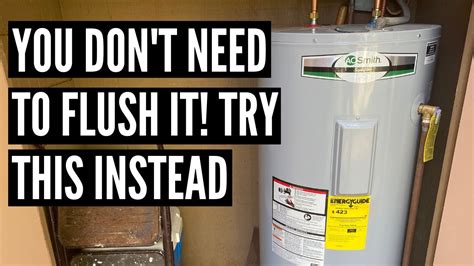Is Your Water Heater Inefficient? Flush it! (Cost)
Is your water heater working harder than it should? Are your energy bills creeping higher each month? You might be surprised to learn that a simple, inexpensive solution could be the answer: flushing your water heater. Sediment buildup is a common culprit behind inefficient water heaters, leading to higher energy consumption and, ultimately, a shorter lifespan for your appliance. This article will explore the signs of an inefficient water heater, explain why flushing is crucial, detail the process, and discuss the associated costs.
Signs Your Water Heater Needs a Flush
Before you grab your tools, let's identify the tell-tale signs that your water heater is suffering from sediment buildup and needs a good cleaning:
- Reduced Hot Water Output: If you find yourself running out of hot water sooner than usual, sediment buildup could be the reason. The sediment insulates the heating element, reducing its efficiency.
- Longer Heating Times: Does it take longer for your water heater to produce hot water? This is another strong indicator of sediment accumulation. The sediment acts as an insulator, slowing down the heating process.
- Noisy Operation: Gurgling, rumbling, or popping sounds coming from your water heater are often signs of sediment buildup. The sediment can cause the water to overheat and create these noises.
- Increased Energy Bills: A less efficient water heater consumes more energy to heat the water, leading to a noticeable increase in your utility bills. This is a key financial indicator that something is wrong.
- Cloudy or Rusty Water: While not always directly related to sediment, cloudy or rusty water can suggest corrosion within the tank, often exacerbated by sediment build-up.
Why Flushing Your Water Heater is Crucial
Regular flushing is preventative maintenance that can significantly improve your water heater's efficiency and longevity. Here's why it's so important:
- Improved Efficiency: Removing sediment restores the heating element's ability to transfer heat effectively, reducing energy consumption.
- Extended Lifespan: By removing corrosive elements and preventing overheating, flushing helps prolong the life of your water heater.
- Reduced Repair Costs: Addressing sediment buildup proactively can prevent costly repairs or premature replacement.
- Cost Savings: Lower energy bills and a longer lifespan translate to significant savings over time.
How Much Does it Cost to Flush a Water Heater?
The cost of flushing your water heater depends on whether you do it yourself or hire a professional.
DIY Flush: The cost is minimal, primarily consisting of the price of a garden hose and potentially some cleaning supplies. You can expect to spend less than $20.
Professional Flush: Hiring a plumber to flush your water heater will cost more, typically ranging from $100 to $300, depending on your location, the plumber's rates, and the complexity of the job. This cost includes labor and potentially any necessary materials.
What's Involved in a DIY Water Heater Flush?
Safety First: Always turn off the power or gas supply to your water heater before attempting a flush. Allow the water to cool completely.
The Process: This typically involves connecting a garden hose to the drain valve at the bottom of the tank and draining the water into a suitable container. You'll then flush clean water through the tank to remove the sediment. Detailed instructions can be found online through reputable sources, but caution and careful consideration are always necessary.
How Often Should You Flush Your Water Heater?
The frequency of flushing depends on several factors, including the hardness of your water and the age of your water heater. As a general guideline, flushing every 6 to 12 months is recommended for areas with hard water, while every 2 to 3 years may suffice for areas with softer water.
What if I Don't Flush My Water Heater?
Neglecting to flush your water heater will eventually lead to decreased efficiency, increased energy bills, shortened lifespan, and potential costly repairs. In extreme cases, severe sediment buildup can cause the tank to fail prematurely.
Conclusion
Flushing your water heater is a simple, cost-effective maintenance task that can significantly improve its efficiency, extend its life, and save you money on your energy bills. Whether you choose to tackle it yourself or hire a professional, taking proactive steps to maintain your water heater is a smart investment. Consider the signs mentioned above, and don't hesitate to flush your water heater to enjoy the benefits.

